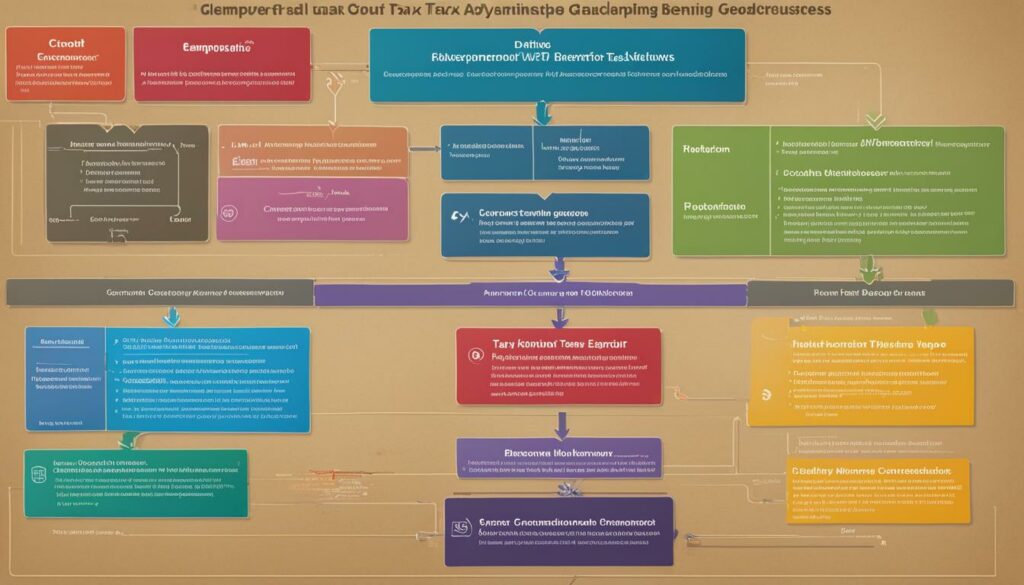When it comes to boosting your bottom line, tax planning for glamping start-ups isn’t often heralded as a glamorous task—but could it be the secret ingredient to your financial success? In an industry blending the serenity of nature with the luxuries of modern hospitality, understanding small business tax breaks for glamping sites is a critical piece of the fiscal puzzle. Fortunately, there’s a world of glamping business tax strategies waiting to be unlocked, strategies that can transform your approach to fiscal management and amplify your profits.
Key Takeaways
- Discover why strategic tax planning is an underestimated tool for increasing profitability in glamping ventures.
- Learn how to identify the small business tax breaks specific to glamping sites that could significantly lower your tax liability.
- Understand the steps to develop glamping business tax strategies tailored to the unique financial landscape of your luxury camping enterprise.
- Gain insights into tax planning that aligns with your business growth and enhances financial sustainability in the long run.
- Uncover the importance of staying informed and compliant to ensure you’re not leaving money on the table come tax season.
Understanding the Basics of Tax Planning for Glamping Start-Ups

Embarking on a glamping business adventure brings with it the excitement of combining outdoor splendor with luxury hospitality. However, to ensure that your business flourishes financially, it’s essential to grasp the rudiments of tax planning. The tax realm can seem daunting at first, but by acquainting yourself with the tax advantages for glamping business, you can fortify your venture’s financial health right from the start.
Before diving into the complexities of tax codes and regulations, let’s simplify the basics to set a sturdy foundation for your glamping enterprise.
Setting the Foundation: What New Glamping Businesses Need to Know
For starters, the Internal Revenue Service (IRS) acknowledges several tax deductions for glamping entrepreneurs that can significantly lower tax liabilities. Understanding what expenses qualify for deductions—from the purchase of tents to the costs of utilities—is an indispensable first step. Moreover, special government incentives may apply to your business if you’re advocating eco-friendliness or contributing to rural development.
Your tax obligations will differ based on the structure of your business, be it a sole proprietorship, partnership, or corporation. Each structure bears its own set of tax requirements and potential benefits. Therefore, selecting the right business entity is not only a legal formality but also a pivotal tax decision that will impact your financial outcomes.
Navigating Through Taxes: A Glamping Entrepreneur’s Primer
Gleaning tax tips for luxury camping businesses from reputed sources like the National Association of RV Parks & Campgrounds (ARVC) and Glamping Industry Market Reports can provide a tailwind to your tax planning strategies. These resources often highlight the latest allowable deductions and credits specific to the glamping sector.
At the initial stages of your business, it’s crucial to maintain accurate records of all expenses and revenues. This documentation is the keystone of your tax filing process and will be your best defense should any queries or audits arise. Implementing an organized accounting system early on will pay dividends in the form of a smoother tax filing experience.
Awareness of your tax obligations and the timing of filings can prevent unnecessary penalties, ensuring that your focus remains on growing your glamping business rather than untangling tax predicaments.
By embracing these foundational tax principles, you’re on your way to architecting a tax-efficient business plan that aligns seamlessly with your glamping enterprise’s financial goals. Stay ahead of the curve, and let your flair for luxury outdoor experiences translate into a savvy financial strategy.
Glamping Business Tax Strategies: Your Guide to Smarter Savings
As a glamping business owner, it’s essential to tap into the potential tax savings that can bolster your financial resilience. The trick lies in deftly navigating tax laws and maximizing tax benefits in the glamping industry to diminish liabilities and elevate profit margins. Let’s explore some smart glamping business tax strategies that could put you on the path to substantial savings.
According to the Tax Foundation, proactive tax planning is paramount, especially for industries like glamping, which meld traditional hospitality with unique outdoor lodging experiences. By staying informed about the latest tax regulations and benefits specific to your niche, you can chart a course for fiscal efficiency and success.
Forbes emphasizes that “timing is everything in tax planning.” By making informed decisions at the right moments—such as the acquisition of assets or the choice of your depreciation method—you’re not just saving money; you’re crafting a strategic foundation for sustained growth and profitability.
- Asset Purchase Strategies: Timing large purchases to coincide with tax benefit cycles can lead to significant deductions.
- Depreciation Tactics: Opting for an accelerated depreciation schedule can front-load deductions, thereby reducing taxable income earlier in the asset’s life.
- Employment Incentives: Hiring from certain demographics may grant you access to tax credits, thereby decreasing overall tax burdens.
The following table illustrates a high-level breakdown of common tax strategies that could lead to savings for glamping businessowners:
| Strategy | Potential Benefit | Considerations |
|---|---|---|
| Section 179 Deduction | Immediate expense deduction of qualifying assets | Assess asset eligibility and plan for the best timing of acquisition |
| Bonus Depreciation | Acceleration of depreciation in the first year of asset use | Ensure compatibility with your chosen accounting methods |
| Work Opportunity Tax Credit | Tax credit for hiring from certain groups, such as veterans or the long-term unemployed | Document hiring practices and eligibility verification |
| Green Energy Credits | Tax credits for sustainable practices and renewable energy use | Stay abreast of evolving credits and eligibility criteria |
Keep in mind, consulting with a professional who understands the intricacies of tax savings for glamping owners can further fine-tune these strategies. By building a relationship with an advisor who has expertise in maximizing tax benefits in the glamping industry, you can ensure that your glamping business tax strategies are as robust and effective as possible.
Exploring Tax Advantages for Glamping Business Owners

As owners of glamping start-ups, delving into the realm of tax planning can reveal a treasure trove of savings opportunities tailored to your unique business model. Whether you’re just setting up your luxurious retreat or looking to expand, understanding and leveraging specific tax deductions for glamping entrepreneurs is vital for your financial success.
Special Considerations for Luxury Camping Businesses
Your glamping venture is not just about delivering exceptional experiences; it’s also about engaging in smart tax planning that reflects the uniqueness of your enterprise. According to the Outdoor Industry Association, glamping businesses often qualify for a variety of tax advantages due to their nature. These range from deductions for eco-friendly upgrades to potentially underused write-offs for rural tourism development. Your role as a business owner is to identify and capitalize on these benefits, ensuring your company’s longevity and profitability.
Capitalizing on Unique Tax Benefits in the Glamping Niche
Specifically, the Small Business Administration (SBA) highlights that tax planning for glamping start-ups must consider incentives for practices such as renewable energy use or sustainable construction methods. These not only lower your carbon footprint but can also significantly reduce your taxable income. Here’s a snapshot of the potential tax deductions glamping entrepreneurs like you may be eligible for:
| Deduction Type | Benefit | Rationale |
|---|---|---|
| Eco-Friendly Improvements | Potential tax credits or deductions | Incentivizes sustainability efforts |
| Rural Business Development | Tax reductions or grants | Encourages economic growth in less-developed areas |
| Property Depreciation | Decreases taxable income over time | Accounts for the declining value of real estate and improvements |
In a field where every detail counts, from the thread count on the linens to the local ordinance compliance, embracing these tax advantages can swiftly turn into a financial game-changer for your glamping business. Keep in mind that staying updated with the latest tax laws is crucial, which may require the guidance of tax professionals well-versed in the hospitality or outdoor industry sectors.
Maximizing Tax Benefits in the Glamping Industry

The glamping industry presents unique opportunities for savvy business owners to tap into a range of tax advantages tailored to their distinctive offerings. By staying abreast of the latest small business tax breaks for glamping sites, you can leverage these incentives to significantly impact your business’s financial well-being. Not only can these benefits reduce your current tax liability, but they can also contribute to a long-term strategy that ensures ongoing success and sustainability.
How to Leverage Tax Breaks for Your Glamping Site
Seizing the tax advantages for glamping business owners begins with being informed. The National Glamping Forum and Tax Practitioner Journals both offer insight into maximizing these benefits. For instance, consider:
- Immediate write-offs for capital investments in tents, facilities, or energy-efficient assets.
- Deductions for operational costs like marketing, site maintenance, and employee training.
- Specialized credits for employing energy-saving solutions or contributing to the local economy.
Meticulous record-keeping is paramount to prove eligibility for these tax breaks. Organize and maintain all receipts and documents related to qualifying expenditures.
Long-Term Planning: Building a Tax-Efficient Glamping Enterprise
Your journey towards a tax-efficient glamping enterprise involves multi-year strategies that encapsulate not only today’s tax breaks but also future financial prospects. Adopting a funnel approach—beginning with broad research and narrowing down to specific incentives—can set your business on the right path.
| Long-Term Strategy | Benefit | Implementation Tip |
|---|---|---|
| Investing in Sustainable Infrastructure | Qualify for eco-friendly tax credits; build a positive brand image. | Explore grants and local incentives for solar panels or water-saving devices. |
| Asset Depreciation Schedules | Spread out deductions and manage cash flow effectively. | Consult with a CPA to determine the optimal schedule for your assets. |
| Employee Development Programs | Potential deductions and improved service quality. | Create ongoing training programs that qualify as educational expenses. |
Remember, tax codes evolve, and so should your strategies. Engage with tax professionals who specialize in the hospitality sector and can provide guidance specific to the glamping industry. Building a relationship with these experienced can ensure that you continue to maximize tax benefits as your glamping site grows.
Identifying Tax Deductions for Glamping Entrepreneurs

If you’re a glamping business owner looking to trim your tax bill, it’s crucial to learn about potential deductions. Certified Public Accountants (CPAs), well-versed in the hospitality industry, alongside insights from Glamping Business Blogs, provide vital tax tips for luxury camping businesses. Let’s delve into the overlooked areas where you might find tax savings for glamping owners like yourself.
Maximizing your deductions means more than just keeping receipts; it involves a deep understanding of which expenses are actually deductible. Operational costs, for instance, often hold hidden tax relief opportunities. From property investment expenses to day-to-day operational cost deductions – here’s what you should focus on.
- Property Investments: Any improvement or addition to your glamping site can be deducted. This includes everything from constructing new guest amenities to landscaping enhancements.
- Operational Costs: Running a luxury camping site incurs various expenses. You can mitigate these costs through deductions on utilities, maintenance, and possibly even certain hospitality-related subscriptions.
- Marketing and Advertising: Never underestimate the deductibility of marketing. Spending on advertisements can be a great area to recover costs via tax savings.
- Training and Education: An often-missed deduction is for the training and development of your staff, which is essential for maintaining a high level of service at your glamping site.
Tracking these expenditures diligently throughout the year is key. By maintaining organized records, you enhance your ability to identify and claim the deductions available to you.
| Expense Category | Possible Deductions | Notes for Glamping Entrepreneurs |
|---|---|---|
| Capital Investments | Section 179 Property Deductions | Includes equipment, vehicles, software, and property improvements |
| Operational Costs | Utility Bills, Maintenance, Insurance | Regular expenditures for running your site |
| Marketing | Advertising Expenses | Online, print media, and promotional event costs |
| Training & Education | Staff Development | Can include seminars, webinars, and certification courses |
A pro tip from industry experienced: look for niche-specific advice on glamping business blogs and consult with CPAs who have insight into your field. Combining these sources can reveal the full spectrum of tax savings for glamping owners that might otherwise go unnoticed. As taxes can be a challenging area to navigate, professional guidance is often instrumental in identifying and claiming all your legitimate tax deductions.
Ultimately, smart tax management aligns perfectly with savvy business operations. By staying well-informed and proactive, you solidify your financial footing and support the ongoing success of your luxury camping enterprise.
Tailoring Tax Tips for Luxury Camping Businesses
Entering the unique domain of glamping, you embark on a journey through lush landscapes and luxe comforts. Balancing that tranquility with sound financial practices involves tax planning for glamping start-ups, ensuring you capitalize on every opportunity to save. In this essence, being aware of the bedrock of beneficial tax deductions for glamping entrepreneurs is fundamental to the prosperity of your business venture.
Business Insider reports that specialized industries like glamping are often eligible for unique tax breaks that can make a tangible financial difference. With this in mind, understanding the tax advantages for glamping business ventures becomes a prime skill that could catapult your enterprise into fiscal success.
Key Deductions and Credits to Consider
Scrutinizing your expenditures could unveil a wealth of deductible costs that service your business’s growth while easing your tax burden. Accounting Today emphasizes a robust assortment of deductions that glamping entrepreneurs should not overlook.
- Equipment and Structures: Cost of luxury tents and related capital expenditures are often eligible for deductions.
- Operational Expenses: Utility costs, site maintenance, and even staff uniforms can chip away at your taxable income.
- Eco-friendly Investments: Receive credits for sustainable features that enhance your glamping site’s green profile.
Proactive Tax Moves That Can Save You Money
Engage in proactive tax planning throughout the year to not just reduce taxes but to align these activities with your business strategy. Here is a practical illustration designed to guide glamping entrepreneurs in leveraging tax moves for maximum financial benefit:
| Action | Benefit | Timing |
|---|---|---|
| Acquire Energy-Efficient Assets | Eligibility for tax credits | Before fiscal year-end |
| Capitalizing on Depreciation | Spread costs over the useful life of the asset | At purchase |
| Preserve Comprehensive Records | Ensure all deductions are substantiated | Ongoing basis |
Remember, the intricacies of tax codes can seem labyrinthine, but with an early focus on tax strategy, you can pave the pathway to a prosperous and financially sound glamping operation.
Uncovering Small Business Tax Breaks for Glamping Sites
Glamping site owners, if you’re not leveraging small business tax breaks, you might be missing out on significant savings. While the glamping industry requires substantial investment, tapping into various tax strategies can lessen the financial load. Focusing on Entrepreneur Magazine and the Chamber of Commerce for Small Businesses as key resources, we’ll guide you through maximizing tax benefits in the glamping industry.
Common Overlooked Deductions and How to Claim Them
Despite the availability of small business tax breaks for glamping sites, many owners overlook crucial deductions. These could include expenses related to site development, the purchase of luxury accommodation amenities, or even landscape improvement costs. To claim these, ensure your accounting records are meticulously detailed and that you categorize expenses accurately for deduction eligibility.
| Deduction Category | Example Deductions | Action Steps for Claiming |
|---|---|---|
| Site Development | Infrastructure improvements, utility setup. | Document all development-related expenses; consult a tax advisor for eligibility. |
| Luxury Amenities | High-end tents, bespoke furniture. | Keep purchase receipts; classify as business expenses in financial records. |
| Landscape and Environment | Native plantings, eco-friendly landscaping. | Record all gardening costs; identify potential environmental credits. |
Qualifying for Tax Credits: A Game Changer for Small Glamping Businesses
Qualifying for tax credits can be a pivotal moment for small glamping businesses, with the potential to turn tax time into an opportunity for significant savings. Credits for environmentally sustainable practices or for creating jobs in certain zones can have a pronounced impact on your taxable income. Collaborate with a tax professional who can help your business optimize these credits and secure every advantage available within the glamping business tax strategies.
“Claiming the right tax breaks can be just as meaningful to a small business’s bottom line as earning new customers,” reports Entrepreneur Magazine.
- Investigate environmental tax credits for which your glamping site may be eligible, particularly if you’ve invested in sustainable practices.
- Look into employment-based incentives, such as the Work Opportunity Tax Credit, if your hiring practices align with the program’s requirements.
To make the most of your glamping business tax strategies, stay informed about the tax landscape. Regular updates from Entrepreneur Magazine or your local Chamber of Commerce can provide fresh insights into evolving opportunities to maximize tax benefits in the glamping industry.
Ensuring Proper Tax Compliance and Savings for Glamping Owners
Navigating the tax implications for glamping businesses is a crucial element of running a successful luxury camping enterprise. Drawing on expertise from Tax Attorney Specialists and insights from the Glamping Hub Report, this section concentrates on the pivotal balance between tax compliance and seizing legitimate tax savings for glamping owners. It’s essential for glamping entrepreneurs to align their fiscal strategies with tax regulations to prevent any setbacks that could arise from non-compliance.
Tax tips for luxury camping businesses often hinge on maintaining precise records and understanding the subtleties of applicable deductions and credits. In aiming to capitalize on tax savings for glamping owners, one must practice due diligence by staying up-to-date with current tax laws. This ensures a position to benefit fully from available tax breaks while also positioning your business to pass any scrutiny by tax authorities. Your goal is to ensure that every financial decision complies with tax laws, thereby shielding your business from penalties or in-depth audits that could distract from operational goals.
Ultimately, when integrating tax strategies into the broader spectrum of your business practices, consider the delicate balance of maximizing potential savings against the backdrop of strict adherence to tax codes. Leverage the resources and advice available to you—keeping in line with both the recommendations of tax professionals and sector-specific reports—to cultivate a glamping business that thrives financially while operating within the bounds of legal tax obligations.
FAQ
Why is strategic tax planning essential for glamping businesses?
Strategic tax planning is essential for glamping businesses because it helps to ensure the profitability and viability of the enterprise. By understanding and leveraging tax implications and benefits, glamping business owners can significantly impact their bottom line, reducing tax liability and increasing their financial health.
What are the initial tax considerations for a new glamping business?
New glamping business owners need to understand fundamental tax concepts such as the structure of their business, which will affect their tax obligations. They must familiarize themselves with local, state, and federal taxes, ensure proper record-keeping, and potentially qualify for deductions specific to the hospitality and leisure industry.
What are some effective tax strategies for glamping business owners?
Effective tax strategies for glamping owners include deferring income, choosing the right business structure, making use of accelerated depreciation, maximizing deductible expenses, and considering the timing of income and expenses to manage tax liability. Business owners should also stay informed about changes in tax laws that may affect their operation.
What unique tax benefits can glamping businesses capitalize on?
Glamping businesses might benefit from unique tax breaks such as deductions for eco-friendly practices, rural business development incentives, and specific tourism-related concessions. Taking advantage of these can reduce taxable income and enhance profitability.
How can glamping site owners maximize tax benefits long-term?
Long-term tax benefit maximization for glamping site owners involves employing strategies such as investment in assets that appreciate over time, retirement planning, and structured business growth that considers tax brackets and rates. It also means keeping abreast of new tax credits and incentives as they develop.
What type of tax deductions should glamping entrepreneurs look for?
Glamping entrepreneurs should look for tax deductions on expenses related to property investment, operational costs, maintenance, employee salaries, and marketing. They should also consider deductions on utilities, insurance, and any interest on business loans or mortgages associated with the glamping venture.
What are some proactive tax moves for luxury camping businesses?
Proactive tax moves for luxury camping businesses include adjusting business strategies based on current tax laws, employing effective year-end tax planning, electing the correct depreciation methods, utilizing carryover losses when applicable, and potentially re-structuring the business to take advantage of more favorable tax treatments.
How can small glamping businesses uncover and claim overlooked tax breaks?
Small glamping businesses can uncover and claim overlooked tax breaks by thoroughly documenting every business expense, educating themselves on the latest tax codes, consulting with tax professionals, and proactively searching for industry-specific incentives. They should stay informed about local credits and grants available for small businesses and consider community or environmental contributions that might offer additional tax savings.
What steps should glamping owners take to balance tax savings with compliance?
To balance tax savings with compliance, glamping owners should engage a knowledgeable tax professional or attorney who specializes in small businesses or the hospitality industry, maintain accurate and comprehensive financial records, and ensure all tax filings are accurate and timely. This balance helps to minimize risks of penalties and audits while still optimizing possible tax savings.





